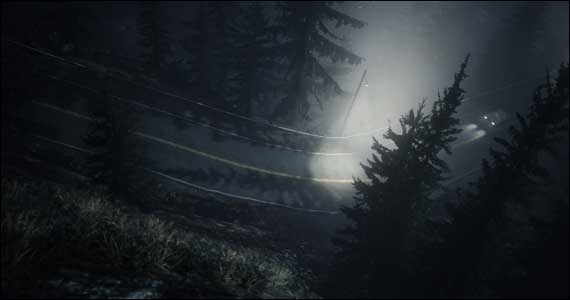
Previously on Gamesugar –
We received a package in the mail, a review copy of Alan Wake. The envelope it came in deceptively hid the real weight of the contents, carrying the immense expectations caused by bold announcements made early in the development process, and aspirations focusing too much attention on the ability of a single game to define a hardware cycle.
From my own detached position I expected something Silent Hill sans the sickly sexualized horror that has kept the genre neatly niche. Perhaps I expected the kind of game Sierra might have made, following in a more accessible Gabriel Knight / Phantasmagoria vein.
It wasn’t going to be that simple however, the game somehow resisting the temptation to hover around the sun on the wax wings of hype, instead creating an experience that defends the existence of authoritative narrative in an era of open world desires, bringing along play mechanics that directly feed out of and back into the written words that pull players deeper down the rabbit hole.
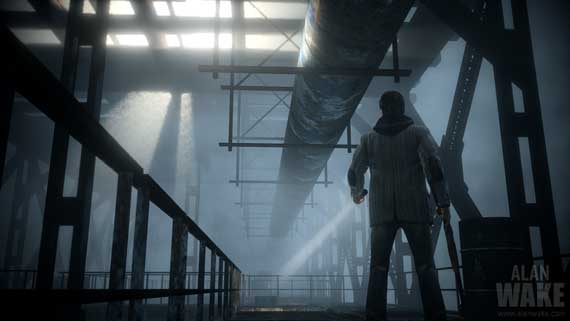
Whether taking the central thesis of the game’s plot, or exploring the player’s role within the world the story creates, Alan Wake is a game about balance. For something to be taken something must be given serves as a fair enough creed of psychological horror, but it also proves to be the solid foundation that Remedy has built their house upon.
It all begins with a dream, which also serves as a tutorial, quickly introducing players to a very simple premise – Alan depends on light to defeat the darkness that pursues him. Stumbling through the endless forests of Bright Falls, light is the constant safe point and companion, representing the same security blanket as the night-light that fights away enough of the darkness to let children sleep soundly through the wolfing hour.
What this means is that everything that attacks Alan is fought back by shining light at it, either by the varying sizes of flashlights players carry, or the flares, spotlights, vehicle headlights and portable lamps scattered throughout Alan’s journey through the darkness.
That struck me as a very simplistic and elegant approach to the design, quickly layered with the reality that shadowy men known as “the taken” must still be dealt with by traditional means after the darkness protecting them is broken – and a few trusted weapons like shotguns and a pistol are the means to that end, complimented by flash bang grenades and a few lights powerful enough to destroy them whole.
When all else fails the player can occasionally clip a few with stray vehicles.
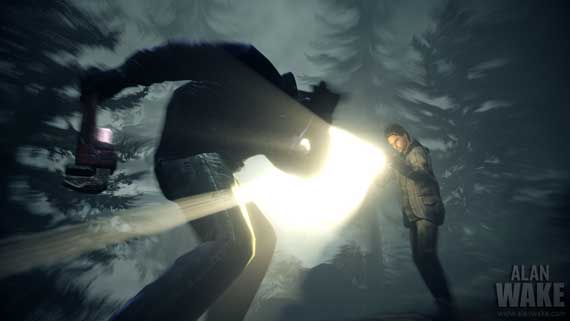
I’ve been dreading this write up a bit – there’s an incredibly easy space to fall into where it will sound like I’ll forgive anything in loving the twists of the narrative – and believe me I’d love nothing more than to spew on here about the implications of the story.
From the outside looking in however, it would also be incredibly easy to take any one aspect of Alan Wake and view it in a very gimmicky light, whether it be the play of light and darkness, the horror writer caught in his own story angle, or the chapter breaks that turn the game into an ideal form of nightly episodic entertainment as well as a bit of slick prime time television mimicry.
In embracing the suspense and horror genre, Alan Wake takes several gimmicky trips to sew together a title that doesn’t take any one of those elements for granted, but engages them, makes them its own, and in deepening that connection of respect creates a comfortable space for itself to emerge as one of the finest examples of that genre given life in the gaming sphere. That attention to detail shimmers in the darkness, from the Twilight Zone knockoff show Night Springs to the characters that emerge from the point where Stephen King meets Twin Peaks.
I had plenty of doubts from the beginning, starting with an awkward introduction, complete with unnecessary narration and some character model syncing that’s hard to love. And yet from the moment I entered Bright Falls, the game offered a story that pulled me deeper with each new chapter, the first game in a long while that earnestly motivated me to continue playing.
That doesn’t mean there aren’t times where moving through the woods grows tiresome. The game does walk a fine line that shows the repetitive limits inherent in most any videogame. The trick seems to be the way Remedy continually changes the situations in ways that freshen that core simplicity of the play mechanics. Alan Wake isn’t toting a machine-gun through the woods, rather the game finds ways to make the average man feel more extraordinary via means that find as much fun in empowering the player as it does in dragging players deeper into the horror at its core.
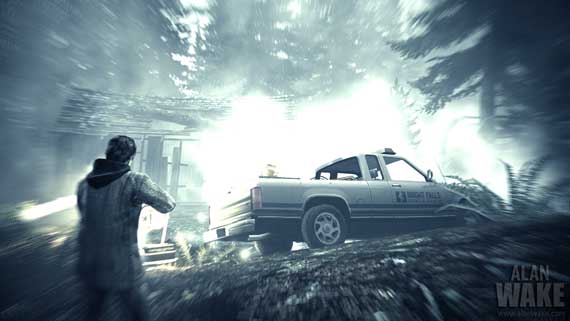
Even yesterday someone who hasn’t yet played the game suggested to me that the story was probably disposable. Having myself set the bar of expectations a bit low, what’s surprising is just how wrong that assumption is. When you come out the other end of Alan Wake its unfeasible that Microsoft supported something so polished and loved – this game is Remedy’s baby, you don’t need to ask them, it shows in every detail, from the conversations to the scenery.
Alan Wake is simply and ridiculously layered, leading players along a trail that takes the scenic route toward two distinct narrative possibilities by the conclusion, which have left me a bit awed – yes awed – at the way a game has tackled the potential for exploring the very idea of the creative process, or the chicken and the egg equation if you prefer.
Plenty of pull is empowered by the chapter breaks the game employs, playing into the idea of a novel as well as creating something that really does flow like a television show, strengthened by play direction that makes it hard to get lost and disrupt that rhythm. The real slick bit of this trick is how it allows Remedy to skip the many obligatory sequences that move a story forward with quick editing and musical escapes that make it hard to leave the next chapter for another day.
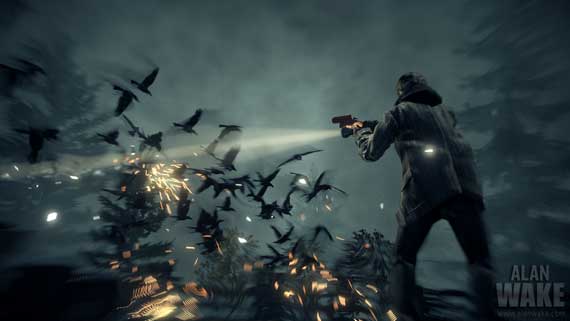
At the same time that I have to cautiously navigate around the plot without spoiling it, I need to hit on how playing the game factors so directly into the very idea of the game itself – players aren’t just shooting characters like an action hero or left killing waves of enemies as the sole emphasis for progression.
Alan Wake asks the player to perform tasks that make complete and absolute sense – sorry if you aren’t as shocked as I am. Seriously though, what the player can do within the space of the game, and the story that unfolds as the player does these things, is so entangled and dependent on one another that it’s hard to conceive of one coming before the other, and certainly difficult to imagine either existing independently of the other – which I insist is a pretty damn rare thing indeed, and even enters into the subtext of the story itself.
Shining light dispels the darkness, and also leaves the player constantly searching for light, an easy thing to accomplish, an easy direction to set ahead of the player to keep the story flowing.
Narrative is key within these midnight strolls through the woods, players finding pages from the unfolding story, which reveal what lurks ahead or lends insight into events that just occurred – leaving much of the mystery up to the player to uncover and making cinema scenes a side feature.
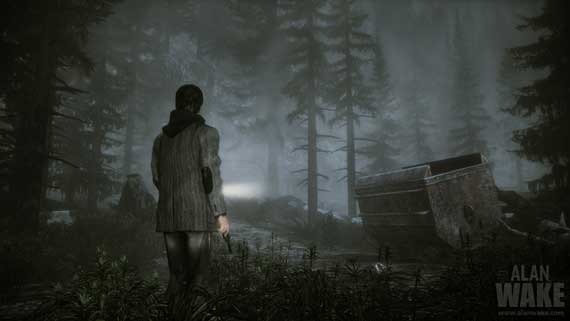
And then there is the way Remedy seems to so often know where they have the player’s attention fixed. The player is always moving along a fairly straight path, so that’s not incredibly hard, but there are plenty of times where Remedy has slipped in moments that depend on you looking at the right place at the right time.
It started giving me a feeling that I often associate with Valve, where one feels that people have really troubled themselves to know what I need and when to have something happen to both maintain and heighten the atmosphere. And there is a continual Valve factor here, from the ammo supply, to the unfolding in-game plot developments, and even down to the way Remedy uses radio chatter, ambient sound, and soul gouging shrieks to complete and authenticate the experience.
When you reach the end and find the brief play at a semiotics lesson that experiments with the role words play within the game, there’s even reason to believe that Remedy’s desire to continue the story can do far more on this established soil to help cement Alan Wake as the game that makes my favorite genre more accessible without surrendering an inch of credibility. That’s the impossible task that the game has achieved, with a balance of aspirations and abilities that makes this release a rare feather in Microsoft’s cap.
Alan Wake
Developer – Remedy Entertainment
Publisher – Microsoft Game Studios
System – Xbox 360
Release Date – May 18, 2010
*A copy of this title was provided by the publisher for review
I have just started playing this game and am enjoying it immensely…even though it often scares the crap out of me. But I am enjoying the story and am glad I bought the special edition for the book and all the extra goodies.
Comment by Gwenyth Love — May 26, 2010 @ 11:50 am
Loving what I’ve seen of Alan Wake so far. It definitely speaks strongly to the creative writer.
Also I can’t forget to mention the Soundtrack is to die for.
Comment by Christina — May 26, 2010 @ 9:58 pm